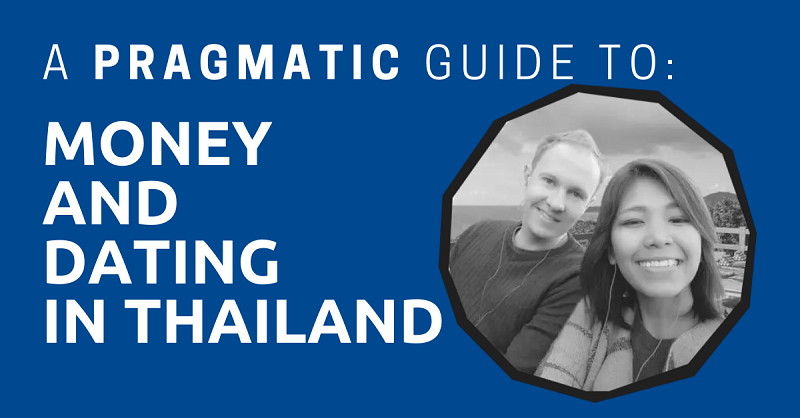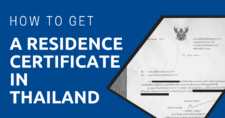
It’s always tricky navigating money and relationships in Thailand.
There are so many expats who are afraid to get into relationships because they hear the negative stories of expats who were taken advantage of by dishonest people or think all people in Thailand are out to take their money.
But this is far from the case.
Thousands and thousands of expats have healthy relationships with Thais in Thailand, relationships in which both parties are responsible for the finances.
By the end of this guide, you will find out how me and my Thai partner manage our finances, so that you can get a better idea of what to expect when you get serious with your partner.
"*" indicates required fields
Disclaimer: This article may include links to products or services offered by ExpatDen’s partners, which give us commissions when you click on them. Although this may influence how they appear in the text, we only recommend solutions that we would use in your situation. Read more in our Advertising Disclosure.
Contents
My Background
It’s useful to begin by telling you a little about my relationship and circumstances so that you can better put things into context.
I have been living in Thailand for many years. I teach English in Thailand and do the odd writing job which, in total, brings in between THB75,000 to THB80,000 per month. I used to work for a golf company in the U.K. and, before I came to Thailand, I had GBP30,000 in savings, which I used to buy a condo in Bangkok.
My Thai Partner
My Thai partner, Nook, works as an English tutor and does the odd private classes, which brings in around THB25,000 per month. Before we met, Nook lived in America for one year but worked in Asia Books before that. I would say Nook is a good example of the increasing number of middle-class people in Thailand. She makes good money, rents a decent house, and has disposable income to spend.

We’ve been together for some time now and live on Nawamin Road, which is on the outskirts of Bangkok. We met at the nearby Fashion Island shopping mall and hit it off straight away.
At around THB100,000 a month, we make a decent amount combined but would like more to make life in Thailand more comfortable. We both have aims to increase our salary over the coming year. I’m aiming for closer to THB100,000 a month and Nook would like to bring in THB35,000 each month.
In terms of monthly outgoings, we have to put aside around THB45,000 per month, which covers accommodation (mine and Nook’s family’s), utilities, student loans, and gym memberships. This leaves around THB55,000 for everything else. I’ll go into more details below in terms of what we spend and who pays for what.
Our First Date
On my first date with Nook, I paid for lunch and she paid for drinks and ice cream after. I offered to pay for everything, but she insisted on paying for the latter. I actually found that a lot of Thai women are happy to split the bill or contribute, especially those who have traditional jobs.
We then went on dates to the cinema, restaurants, and some of the parks in Bangkok. We usually shared the bills, as Nook contributed every time. There are probably some guys reading this thinking that women shouldn’t pay on a date, and that is fair enough.
But times are changing and it isn’t uncommon now to split things. We never went to a fancy restaurant or expensive location, so we both felt comfortable paying for things.
Let’s Talk Finances
I’ve never really found it difficult to talk about finances and, to be honest, I talk about money with Nook on a regular basis, whether it is about travel, shopping, or savings.
Being honest with someone can make problems easier to solve, and that is certainly true when it comes to money and relationships in Thailand.
I am of the opinion that both partners can contribute financially even if it’s only a few little things now and again. Even with a lower salary, I feel it isn’t unreasonable for my Thai partner to pay for little things like snacks, drinks, and make a contribution toward bills or shopping.
Of course there are Thais of all ages who will try and get what they can from expats, but I found this very rare among Thais who have decent jobs.
I live outside the center of Bangkok and there are a lot of Thais who have good jobs in the THB18,000 to 30,000 a month range, which is roughly about how much ExpatDen founder Karsten spent per employee when doing business in Thailand.
Many Thais are eager and capable of contributing financially to their relationships. You will see later that even though Nook has financial responsibilities with her family, she still chips in with our relationship.
Salaries
Being honest and direct about our salaries helped my girlfriend and me decide how to split costs reasonably. Bringing these things up on a first date is a mistake, but once you’re in a serious relationship it helps, as you can plan and set budgets together.
Many Thai people assume expats make massive salaries, and likewise a lot of expats assume Thais make lesser salaries. An understanding of how much each partner makes helps you create a plan. There is a growing middle class in Thailand, and with the increase in university attendance, salaries are creeping up to over THB15,000 a month for new graduates.
After a couple of years working at a decent company, it isn’t unreasonable for young Thais in their early- to mid-20s to earn over THB20,000 a month. A degree in a good subject and some hard work means salaries of over THB30,000 aren’t unheard of.
Sure, most of the people in the country still earn a minimum wage of THB350 per day. However, in reality, you probably won’t be mixing in the same social circles as those earning minimum wage, so you wouldn’t be dating someone from this demographic.
Nook used to earn closer to THB30,000 per month, and even at that level I felt like it wasn’t a huge amount. But it’s amazing to see how she can stretch money. Sure, she doesn’t make too many impulse buys, but she knows how to find a bargain and is normally quite sensible when it comes to shopping.
Living Together
When I first started dating in Thailand, I knew that I wanted to meet someone and settle down.
That eventually happened with Nook. I moved in with her after about 15 months of dating. By this stage, we were aware of each other’s financial statuses and had discussed who would be responsible for what.
Moving in together was a big step, and there were many financial implications that we had to think through and discuss.
We agreed that I would pay THB30,000 a month to cover the condo. Keep in mind that your monthly cost can be higher or lower depending on where in Thailand you live. When it came to the utilities, Nook agreed to pay for the electricity, and I’d cover the water, maintenance fees, and Internet. This arrangement has worked out well.
Be 100 percent certain when moving in together that you can each stick to your ends of the agreement. I have a friend who moved into a swanky THB50,000-per-month-condo because his partner said that she would contribute THB10,000 a month. After a month, her contributions decreased, and now he is lucky to get anything.
The way I looked at things was that even if Nook couldn’t contribute anything to our monthly costs of living in Thailand, I would still be able to cover everything. After all, I was already living there alone for a year before she moved in, and everything was fine.
Shared Expenses
Having said all that, it’s time to dive into exactly how much we pay each month.
Overall Cost of Living
Sure, some things in Thailand are cheap but it’s still easy to spend a lot very quickly. The table below shows our average monthly spending and, following that, a short description to give you an idea of what is included and who spends what.
Remember as I said above, our combined monthly income is around THB100,000.
Read more: Cost of Living in Thailand as an Expat: How Much Do You Need Per Month?
| Accommodation | 38,500 |
| Utility Bills | 7,000 |
| Transport | 2,500 |
| Food | 20,000 |
| Entertainment | 3,000 |
| Travel | 15,000 |
| General Shopping | 5,000 |
| Other | 4,000 |
| Total | 95,000 |
Accommodations
This is the rent Nook pays for her family’s house (THB8,500) and my payments toward my condo (THB30,000).
Nook rents a three-bedroom house for her mother and brother. She sometimes gets one or two thousand Thai Baht from her brother to help out, but this isn’t guaranteed.
At THB8,500, it’s cheap for renting in Bangkok, but it takes up a third of her salary. I cover the full cost of my condo and plan to have it paid off in three or four years’ time.
I read somewhere that you shouldn’t spend more than about 30 percent of your income on accommodations, and we are a little over that. We had also planned to buy another place which would have taken us close to 50 percent, but I realized after a couple of months that it was a mistake and would’ve put our finances under too much strain.
Utilities
Nook covers the bills at her mom’s place. Water, electricity, and TV/phone come to around THB2,000 a month on average.
At our place we have Internet, Netflix, Sport365 TV package, water, phone, electricity, and condo maintenance bills, which are around the THB5,000 mark.
Nook pays for her phone and the electricity, about THB1,350 a month, and I pay for the rest.
Transportation
It’s easy to get around Bangkok. We try to travel mainly by bus, van, and songthaew to save on costs, but also because these methods are easy for the short journeys we make.
We are each responsible for our own transportation, and our jobs actually provide us with travel allowances. When we go in a taxi together, we take turns paying. We rarely go on expensive taxi journeys, the only exception being when we go to the airport.
I have thought about buying a car, but the monthly payments would be over THB8,000 a month, which doesn’t make sense when I could travel everywhere by taxi for less and not have to worry about car insurance and taxes.
If we moved to a different area, then it’s possible we would look into this again, and I guess I would be the one to cover the cost.
Food
We tend to eat out around two nights a week and go out for lunch two times as well. We usually go to mid-level restaurants, which cost around THB300 to THB500 for the two of us.
If a bill comes to THB500 I normally pay THB300 and Nook pays THB200. This way we both contribute and occasionally treat each other to a meal. On the rare occasion that we go out for a meal at an expensive place, I will pay. But this only happens every two or three months.
In terms of grocery shopping, we each buy our own things and message the other to pick up food on the way home from work. We don’t have a shopping list and most of the time we actually buy things from local stalls or shops to eat at home.
Entertainment
The majority of our entertainment revolves around going out to eat and watching movies at home. We don’t go out drinking or have crazy nights out very often.
Occasional trips to the movie theater cost around THB700 for the two of us, and we split the amount.
We play badminton once or twice a week, and that costs about THB100 per time, and we take turns paying.
Travel
Vacations are an area where we are still working on the best way to split costs. It would be fair to say that I pick up the majority of the costs, but Nook does chip in when it comes to meals or visiting attractions.
We normally go away three or four times a year with one big trip and three smaller ones.
This is the one area of our relationship where I do cover most of the expenses, including flights and hotels. To be honest, if we stuck to paying 50/50 it would limit us to short three- or four-day vacation in Thailand, as Nook wouldn’t be able to afford international flights.
Miscellaneous Items
When it comes to buying clothes, toiletries, and general items, we are each responsible for our own expenses. We rarely go shopping together as I hate going to the mall, and Nook doesn’t like going with me. We buy each other the odd gift, but never that often.
We just took out gym memberships at Fitness First, which works out to around THB2,500 a month each. We pay for this individually on our credit cards to get a lower rate than paying via direct debit.
There are normally other unexpected things we need to buy or pay for each month. If it’s something big, then we cut back in other areas to cover the difference.
Savings
So at the end, you see, we save around THB5,000 a month.
Actually that isn’t really true as we save closer to THB20,000, but then spend a lot of it on traveling, which is included in my costs above.
A net save of THB5,000 a month means that my bank balance is growing quite slowly, and although I do have enough to cover emergencies and the like, it isn’t a huge amount. If Nook didn’t have to pay the rent and bills at her mum’s place, then we could save more, but that situation will never happen.
I suppose we are waiting for my condo to be paid off in the next three years or so, and then we will be able to save a good amount. We haven’t sat down and talked about what we will do with these savings, so that is something we will do closer to the time.
Cultural and Traditional Considerations
When it comes to money and relationships in Thailand, you also have to consider some of the cultural and traditional practices in the country.
Giving Money to Family Members
Outside of those in the upper class of Thai society, a lot of people have to take care of their family. This means paying rent and bills or sending money monthly to support older family members.
I already mentioned that retirement is an afterthought for most Thais, and that the system lets people down badly. It’s quite depressing to think that poverty is a real fear for many people and the chance to enjoy retirement is restricted as survival becomes the goal for many.
Your Thai partner might send a lot back home or even just a little. If he or she is lucky, then the whole family will help and the responsibility levels won’t become a burden.
For some people, expats are seen as cash cows, and it’s true that many have made payments to Thai family members or even bought houses, cars, and other assets for them.
My girlfriend’s mother is 59 years old and eligible for retirement next year. This means only THB500 a month will be heading her way.
To put it soberly, THB500 is our daily budget for food and transportation. That is why my girlfriend needs to support her family. I honestly don’t like the idea that children are put in these positions, but what are they going to do, let their parents starve and sleep on the streets?
My girlfriend pays for the rent and bills for the family house, which comes out to around THB10,500 a month. That leaves her with about THB4,500 a month for herself. I have offered to help her, but she won’t accept my money. In the end, I’m not going to force her to take my money, but she knows I am always there should she need help.
I don’t like the idea of an expat being asked to buy houses, cars, and gifts for their partner’s family, and I feel a lot of younger Thais from decent backgrounds understand this. I have never been asked for money to help Nook’s family.
I understand the point of helping the family, and when Nook’s mother stops working it may well be the case that I will have to contribute too as it’s unlikely that Nook will have enough to cover her mom’s living costs. The other option, and maybe one I favor, is that I take over all of our household costs or all restaurant costs and she looks after her family.
Another issue is family members not pulling their weight. Siblings of your partner may feel that they don’t have to contribute as much because their brother or sister has an expat partner and, as such, much more money. This lack of help from a brother or sister toward the family might even have been happening for a long time and not due to a relationship.
Sin Sod
Sin sod is a contentious issue for many expats, and the actual meaning of the word has become distorted.
For those out of the loop, sin sod is a payment made to a bride’s family to show your commitment to their daughter when getting married in Thailand.
Depending on who you talk to, you will hear that it is a dowry or just a show of your good intentions. Some people say the money was returned to them after the wedding ceremony while others never saw it again.
Traditionally, the amount asked for depends on the social status of the family, age, and education of the bride and the partner’s status. I haven’t ever been involved in a discussion like this myself, but a Thai friend of mine paid THB500,000 to his wife’s family to marry her.
She was middle-class but her family have a decent business and a large house. I have also heard of some people paying millions to marry their partner.
The idea of giving money to your fiance’s family to marry her goes against many Westerns’ values, mine included. Some people argue that it’s just a tradition, but that doesn’t fly with me — traditions change and die out.
Sin sod now seems less common across Thailand and, on many occasions, money put on show is returned to the couple. I would also use as an example that in my country, the bride’s family were traditionally supposed to pay for the whole wedding but that doesn’t really happen anymore.
As I said above in the payment to family section, I think the key is to let the family know that you are there for them and will look after them. I know some people will talk about loss of face and cultural issues, but the other thing to consider is that I don’t have a huge amount of savings to put on the table, even if it was all going to be returned to me.
Money Standards
When it comes to spending money, my girlfriend and I also have different ideas on what’s acceptable.
I remember a day when my girlfriend invited me to try a new place for lunch. It ended up being one of those roadside joints with plastic chairs, cutlery in a box, and a million flies buzzing around a few cooking pots.
I turned my nose up at the place and said it was a nasty cheap place and wouldn’t ever go back.
It turned out that this place was where my girlfriend would eat when she was younger, and she thought I was snobbish for acting the way I did.
I felt really bad when I found this out, but the problem is I have no desire to eat in those kinds of places.
Sure, the food is cheap (and maybe it is good), but I don’t want to eat next to the road in places that would give food inspectors around the world nightmares.
Don’t get me wrong, I don’t need five-star dining, but I want somewhere half decent. I now know to be more careful and respectful of simple places we visit.
Another time, when my girlfriend and I traveled to the U.K. so she could meet my family, I could see she was shocked at how much money was being spent.
My parents booked us into a lovely hotel in London. The price for three nights was more than her monthly salary in Thailand, and it felt like a waste of money to her.
Spending another THB10,000 on a Thai meal also blew her mind, but spending the same amount in ten minutes at the Harry Potter store was fine. So there are obviously some exceptions to her spending thoughts.
Buying Gifts
My girlfriend speaks to a lot of other Thai women who have non-Thai partners, and one issue that comes up many times is the idea of buying gifts. With special days like Christmas, anniversaries, Valentine’s Day, and birthdays means that up to four times a year they feel obligated to buy us presents, and it becomes stressful.
In reality, Thai people don’t really give gifts very often. If they do, it’s usually only to children who get a birthday present, and even then it isn’t anything expensive.
We now set spending limits for these celebrations to around THB500 to THB1,000. In the end, we normally go out together for a nice meal and exchange a few small things, which is great.
Finally, I learned quickly that feeling like I should pay because I have more money was disrespectful.
I am sure my girlfriend likes it when I take her out for dinner or buy her a gift. However, the idea of me paying for everything is absurd to her. She told me as much on our first date when she picked up the tab at an ice cream place.
Family Provides
If your Thai partner is from a middle- or upper-class background, then it’s likely that they have relied on their family for a large part of their life for all their financial needs.
I work with a lot of single middle- and upper-class Thai people, and they live comfortably as they don’t have to worry about rent, car payments, or insurance bills. Living at home or having a place given to them by the family means that all their bills are covered.
Their parents will grab the bill at restaurants and lend their children the car whenever they need it. This means my colleague’s salary is basically disposable income. That is, they have THB20,000 to THB30,000 a month to spend on shopping, travel, and entertainment.
To give a real-life example, I know someone who spends the equivalent of her salary renting a condo. She also has a BMW and a designer handbag for every day of the week. There is obviously a lot of money coming from the family to support her lifestyle. I’m not saying this is normal, but there are certainly a lot of Thais — male and female — who get support from their family and don’t have to worry about money. A job is something to do with their time; the salary is irrelevant.
It might come as a shock if their partner asked them to use their disposable income to help pay for rent and utilities. People from well-off families have income to spend, but their families won’t always support them if they are in a relationship with an expat.
Those from the middle-class might also find it hard to cut back on their spending to help out with bills, as they don’t want to lower their quality of life.
Keeping Up with the Joneses
In Thailand — as in most places in the world — there is a lot of pressure to have and do the same things as other couples. The idea that you can’t do something because of financial restraints could cause a loss of face in Thailand.
Personally I couldn’t care less if people think less of me because I can’t afford to do something, but it might cause a Thai partner (or their family) embarrassment.
I am lucky that Nook is financially educated and that we’ve never argued about money. We make decent money and can afford to do the things we like. Maybe the one thing I have cut back on is playing golf, as it costs around THB2,000 to THB3,000 each time, and that seems like a lot to her.
How We Handle Bank Accounts, Credit Cards, Mortgages, and Loans
With some of the cultural stuff out of the way, let’s look at how we manage our financial obligations.
Bank Accounts
I’ll be honest, I’ve never had a joint bank account with anyone. My parents have a joint account, and so do my sister and her husband, but I don’t see the need to combine all of Nook’s and my money.
I quite like the idea of buying things for Nook and her buying things for me. It feels like we’re treating each other, as opposed to spending the money from a joint account where I would most likely be paying for it.
Joint accounts are possible to open in Thailand as long as you have the right documents.
Looking around online, it seems that married couples in Thailand have joint accounts to make it easier for a partner to have access to money if the other dies.
It seems rather morbid to me, but I guess when you get older it’s something you think about and, practically, it works out.
In my relationship, I would say we have shared money that we use to live together and work toward the same goals. The total amount we make is spent together, and although I earn more I don’t feel like it’s my money but really a total amount for us to live on.
This situation didn’t happen overnight and only came about after we moved in together.
Read more: The Complete Guide to Opening a Bank Account in Thailand
Credit Cards
Getting a credit card in Thailand as an expat can be challenging, but for Thais with a salary of over THB15,000 a month, it’s relatively easy.
My girlfriend got her first credit card in December 2016, which came with a THB40,000 limit. She chose KTC as it was easy to apply for and has a few discount programs.
It turns out that as an expat, they would accept me if I have a valid two-year work permit, so I decided to get one too.
I am somewhat wary about credit cards and plan to use mine for online purchases. I also plan on using the 10-month interest free payments they offer at various shops such as HomePro and Index Living Mall.
On the other hand, Nook uses her credit card for every purchase so that she can earn reward points. It also proved useful when she chipped her tooth on Christmas day and had to get emergency dental work done. She wouldn’t have been able to pay the bill without a credit card.
In terms of having a joint credit card, I feel that it isn’t necessary and is something I am happy to go without.
Read more: Thai Credit Cards for Foreigners: Requirements and Benefits
Mortgages
Growing up in the UK, buying property with your partner is the natural thing to do. In Thailand, the same holds true. However, it can be challenging to get a mortgage as an expat living in the country.
If you can’t pay for a piece of property with a cash transfer, then you have a few options.
First, if you have a Thai work permit, earn enough income each month, and put down a certain percentage of the property’s sale amount up front, Thai banks will give you a mortgage. And if you combine your salary with your Thai partner’s, you can get an even higher mortgage.
Second, United Overseas Bank (UOB) in Singapore offers international property loans for five countries, including Thailand. You have to speak to one its representatives to find out if you would qualify, but it’s worth a shot.
Third, you can use your Thai partner’s salary and apply for a mortgage under his or her name. To give you an idea of how much you can borrow, SCB and Bangkok Bank were prepared to give Nook THB1.25 million based on a THB22,000 salary. This would result in monthly payments of around THB9,000 over a 15-year period.
However, THB1.25 million can buy only a small property away from the city center, so it isn’t really worth it if you’re looking for a place to live together.
Fourth, you as an expat can be a guarantor on a mortgage for your Thai partner. This could mean you get a larger mortgage but would vary by bank branch. So, you need to go in and speak to their advisers.
Keep in mind that the second and third options above mean you have no legal rights to the property. So, if something were to happen between you and your Thai partner, you’d lose that investment.
Loans
Loans for cars are probably the most common type but in most cases, the bank will ask for a Thai person to be the guarantor on the loan so you can use your partner if they are in employment.
Retirement Accounts
For many people in Thailand, the truth is they rely on their children to help with retirement funds. This means that your Thai partner might have to send money home when they are young instead of thinking about saving for their own retirement.
Personally speaking, I am in my thirties and have recently started thinking more about how I am going to save for my retirement.
I don’t like the idea of relying on children and would hate to put mine (if/when I have any) under this pressure. I am lucky that I have a property in Thailand and my girlfriend seems to be willing to start to prepare for retirement despite being only in her twenties.
Like a lot of employed Thai citizens, she would benefit from a government pension or retirement plan.
We have talked about her getting an investment to start saving, but at the moment things are a bit tight to make a meaningful contribution.
Prenuptial Agreements
I’m not married, but some people who do get married to a Thai or anyone for that matter consider getting prenuptial agreements, or prenups.
It’s possible to get a prenup in Thailand to protect your interests as long as you go through the actual marriage process in Thailand. The inclusions need to be morally and legally acceptable, so it’s best to run through these things with a solicitor, otherwise the prenup might be ignored if the divorce proceeds to a court.
In my opinion, I don’t see a prenup as necessary. My girlfriend contributes to our relationship fully and anything we buy or invest in is for the both of us. I’m not a millionaire and don’t have houses and investments around the world, so it isn’t really relevant to me.
The decision to get a prenup also comes down to trust, and I know I can trust my partner. However, it’s up to you on whether you’d like a prenup for extra security.
Read more: The Complete Guide to Getting Married in Thailand
Final Thoughts on Relationships and Money in Thailand
The idea behind this guide is to show you that money and relationships in Thailand work pretty much the same as anywhere in the world, minus a few cultural and traditional norms.
How Do You Handle Money in Your Thailand Relationship?
If you’re currently in a relationship or married in Thailand, let us know how you and your partner handle the household finances.














Mt Thai girlfriend put a huge emphasis on money. Even saying “In my culture money is the number one most important thing”. I understand the use of sid sod in a wedding and it’s symbolism, but I worry to much emphasis is placed on money before feelings.
You are very generous with your arrangement, easily done when you know the other person is genuinely doing their best to contribute rather shying away from expenses. I would say buying a condo isn’t the wisest thing in a country that doesn’t give you any right to stay permanently and considering you can rent for 5-10k elsewhere but I hope it works out for you. Glad to hear you are considering retirement, the earlier you can start the better I would recommend looking into index funds and making voluntary contributions to your national insurance. Good luck
Richard,
I found your article well written and informative. All the best to you and Nook as you travel this road together.
I’ve moved to Thailand for the climate, safety and cost of living. I’ve visited here for years, but moved here officially this year. I’m not rushing into anything, but I think it is difficult to meet and get to know Thai women such as Nook. I know that there are many women such as Nook, but the challenge is meeting and getting to know them.
If you have suggestions, please let me know.
Thank you
Daniel
Hi Richard. Read this with real interest. Sounds like Nook is a good one, and being younger isn’t as caught up in old ways and traditional trappings.
I’m finding the money aspect of their culture grating and hurtful.
My girlfriend lives in Poland – where we met organically. But being 39 and from a poor region money is annoyingly important to her, in regards to her family.
Having visited them I see they wouldn’t have a pot to piss in.(with and respect her contribution. But she lives in the West, yet expects me to bend and give.
Now I trust her implicitly. But this expectation bothers me.
And it’s also like she gets nudged by people to see what she can get. But she does all the paying her share, though a smaller percentage.
She also has this attitude that “If you don’t want to do something don’t do it” or “when I do something for someone I don’t expect a thank you”. She has a good heart, but is blissfully unaware of how uneven our relationship is.
Difficult.
Very nice feature. I do follow Richard on his blog a lot as well. Thanks for sharing
Thanks for the thorough article Richard! Quick one, having lived in Singapore and Hong Kong, during Chinese New Year, one is expected to give “red packets” to their subordinates and usually to kids as well (not necessarily related to you). Also married people would give to single etc. Is there such a thing in Thailand, either during Songkran or other celebrations? Same question when attending weddings. Any experience as to what/how much to give? noting that generally Thais don’t really give each other gifts. thanks again
The custom exists here as well, though it’s not as ‘strict’ was you describe: Chinese families and companies will definitely do it and people are familiar with the concept. It’s done on the actual Chinese new year.
As a foreign company owner though it wouldn’t be considered mandatory, but it’s nice if you do it. As a manager you could always carry around envelopes with THB 100 notes in it (they’re red) – at USD 3 a pop it’s a nice gesture that’ll be appreciated (and not just for the monetary value).
You can also ask your own staff or family members as they might have some guidelines. If you are looking to pay some bonus anyway, Chinese new year is a good opportunity for it. In general, the ‘more Chinese’ the environment is, the more common/serious the custom would be perceived.
Chinese customs aside, in Thailand itself you’d probably mostly give cash envelopes at weddings with the amount depending on whether it’s a village-outdoor-seating-wedding of a distant friend and with you not having a prestigious position (~ THB 500), to being the close and well-positioned close relative of someone marrying in an expensive Bangkok hotel (~ THB 2,000 to THB 5,000).